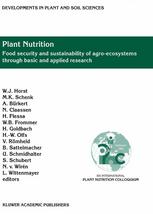

Most ebook files are in PDF format, so you can easily read them using various software such as Foxit Reader or directly on the Google Chrome browser.
Some ebook files are released by publishers in other formats such as .awz, .mobi, .epub, .fb2, etc. You may need to install specific software to read these formats on mobile/PC, such as Calibre.
Please read the tutorial at this link: https://ebookbell.com/faq
We offer FREE conversion to the popular formats you request; however, this may take some time. Therefore, right after payment, please email us, and we will try to provide the service as quickly as possible.
For some exceptional file formats or broken links (if any), please refrain from opening any disputes. Instead, email us first, and we will try to assist within a maximum of 6 hours.
EbookBell Team

4.3
68 reviewsThe world’s population is expected to reach 8 billion by 2025 and most of this growth in population will occur in developing countries. To feed the world with such a marked increase in population, a great improvement in food production must be achieved particularly in these countries. To meet this challenge, present agricultural productivity must be increased on the cultivated land. However, in many developing countries, particularly in Africa, reduced soil fertility caused by continuous cropping with low nutrient input and the resultant nutrient mining of soils is a major threat both to food production and to ecosystem viability. As a result of declining soil fertility, together with increasing population pressure, expansion of crop production to marginal lands and forested areas contribute to the destruction of natural ecosystems. Food production is not only a quantitative challenge. Improving the nutrient status of plants provides a further valuable means of enhancing food quality and is of extreme benefit to the health of both plants and humans. There are several excellent examples showing that plants with optimum nutrient status are better adapted to biotic and abiotic stress factors. Because of population pressures, many global food systems are not currently providing enough micronutrients to ensure adequate micronutrient intakes in the human diet. This has resulted in an increasing prevalence of micronutrient deficiencies that now afflicts over three billion people worldwide.